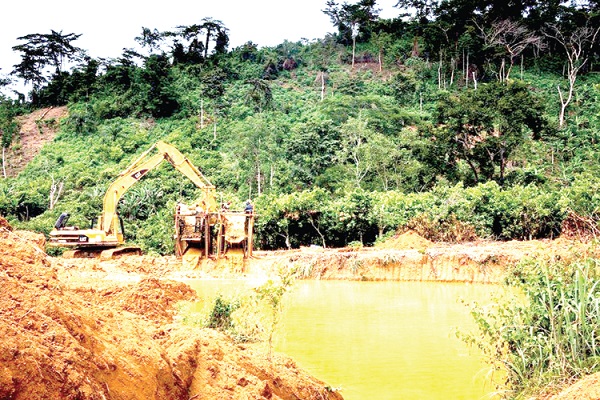
Galamsey gold rush: Hidden costs, power dynamics
Illegal gold mining, locally known as galamsey, is a pressing issue in Ghana. This practice, driven by economic desperation and weak regulatory frameworks, has severe environmental and social consequences.
In this article, we will explore the factors contributing to galamsey, including economic, environmental and social drivers. We will also examine the involvement of the government and political elites, as well as the role of Chinese interests in perpetuating illegal mining in Ghana. By highlighting the consequences of illegal gold mining and suggesting policy recommendations, this article aims both to provide a comprehensive understanding of galamsey and to propose policy recommendations to address it.
Several factors contribute to the prevalence of galamsey in Ghana. Economically, high unemployment rates and poverty push individuals into illegal mining as a means of survival. Environmentally, the rich gold deposits in Ghana’s soil attract miners despite the multiple destructive impacts on the land. Socially, the lack of alternative livelihoods and the allure of quick wealth further fuel this practice.
Government/Political elite involvement
Efforts by the government to address the problem have been hindered by weak regulations and inconsistent enforcement. The institutions responsible for regulating mining often lack the resources and authority to effectively enforce the laws, allowing illegal miners to operate without fear of significant consequences.
Political interests also play a role in hindering the fight against galamsey. Conflicting interests among politicians make it difficult to address the problem effectively. Some officials who publicly oppose illegal mining financially benefit from it privately. Corruption and collusion between politicians and illegal miners further complicate the issue.
The issue is highly politicised, making it problematic to address meaningfully. When the President put his reputation on the line to resolve the matter, things got worse. This situation highlights two key points. First, when national issues are heavily politicised, finding solutions becomes challenging. Second, unless officials are willing to step down when they fail to deliver, progress is stunted. As long as leaders know they will not face consequences for failure, there is little motivation for them and their teams to work diligently.
Collusion
The galamsey gold rush in Ghana is heavily influenced by some Chinese investors and powerful local collaborators. Chinese investors bring in advanced mining equipment and financial resources with the connivance of powerful Ghanaian collaborators, making illegal mining operations both efficient and profitable. Collaboration between Chinese investors and local actors ensures that both parties benefit financially from illegal mining activities. This collusion leads to negative consequences, including severe environmental degradation and social disruption. Local actors’ involvement often means that illegal mining operations are not addressed by those entrusted with enforcing the law; local officials may be bribed or otherwise incentivised to turn a blind eye.
Consequences
As the 2024 presidential and parliamentary elections approach, galamsey is a hot topic. Galamsey has serious, wide-ranging environmental consequences including deforestation, water pollution and a harmful impact on biodiversity. Illegal mining also has very damaging social and economic impacts on local communities, as well as wider economic implications for Ghana.
Environmental and socio-economic impacts are interconnected. Collectively, they have significant implications for Ghana’s sustainable development goals. Illegal mining hampers economic growth by undermining formal, that is, state-controlled mining activities and investor confidence, while significantly limiting state revenue. Galamsey also leads to detrimental effects on important economic sectors, including agriculture, tourism and infrastructure, while environmental consequences, including deforestation, water pollution and soil degradation, pose long-term challenges for sustainable economic development. The health impacts on the living and the unborn are incalculable.
How has galamsey reached such a point of concern in Ghana, both for local communities and for the government? The issue is squarely one of governance. Put another way, galamsey is controllable and requires sustained government action, which is so far not forthcoming, to get a grip on the situation. Whoever is president after January 7, 2025, will necessarily need to tackle the scourge of galamsey. Public opinion will not allow the issue to be brushed under the carpet as the consequences of galamsey are too serious to be ignored any longer by those in power.
Policy recommendations
Earlier government attempts to control and reduce illegal mining have failed for three reasons. First, government seems to lack the ability meaningfully to monitor galamsey. Second, there is an array of logistical, technological and capacity constraints. Third, there have been insufficient collaborative efforts among relevant stakeholders from the public, private and third sectors coupled with the over-politicization of the issue.
The government’s action on the issue of illegal mining is now both necessary and urgent. There is a pressing need for enhanced regulation, enforcement, and institutional capacity building to curtail illegal mining activities and promote responsible mining practices. To do this, whichever party is in power and whoever is the president after January 7, will need to urgently strengthen governance frameworks. This does not only require strong laws, rigorously enforced, but meaningful engagement with local communities, the building of durable partnerships with responsible international stakeholders, and depoliticization of the issue. Without such measures, there is no chance for sustainable economic growth and development where the mining sector is concerned.
Overall, what is needed in terms of policy reform are urgent, meaningful and tangible actions by the government both to combat illegal mining and to create a facilitating environment for responsible and sustainable mining practices in Ghana.
The writers are Emeritus Professor of Politics, London Metropolitan University, UK and a Political Scientist
